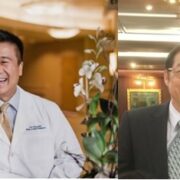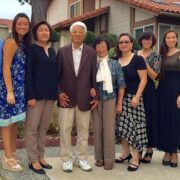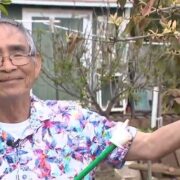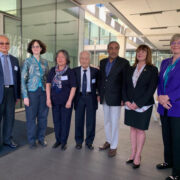My Younger Brother Wen-cheng Chen
By Pau-yueh Chen
I grew up with seven siblings in an impoverished family. As a result, children in my family started working at a young age. We used to pick charcoal scraps around kilns and bring them home to burn as fuel. So did we carry barrels of water and walk more than five kilometers from Tai-shan to Lin-kou.
My mother came from a big, wealthy family at Pan-chiao. Possibly due to her experience and her view on social transitions at different stages, she insisted that education should be the best heritage for her children. In her opinion, if inherited a great amount of property, her children may use them up and become dispossessed someday. By contrast, knowledge cultivated through education will be restored well in mind. More importantly, no matter how ruling regimes alter, as it occurred at least five times in Taiwan history, her children can still rely on their knowledge and manage to survive. With this belief, my mother persisted in affording education for her children even at the expense of selling a few pieces of land.
Such persistence explains why the anguish caused by the sudden death of my brother Wen-cheng became so unbearable to my father. Wen-cheng’s decease meant my father’s lifelong toil drifted into nil. It seemed a vain attempt for him to sell land and invest in the education of his children, as the son he was always proud of was gone.
Among my siblings, Wen-cheng was the most intelligent and he always got the best grades. My father often recalled the time when Wen-cheng was born: “On January 30th, a few minutes past nine in the morning, I smelt unique fragrance soaring out of the ancestral tablet on the worship table. Bright beams streamed in, glazing the worship table in lively luster.” A fortune-teller also predicted that Wen-cheng would become a genius with a promising future.
In poverty the eight children of my family set out on our career respectively. Wen-cheng was my father’s favorite, and his brothers and sisters also looked forward to an outstanding one arising among them. Thus since our childhood, the elder siblings took good care of Wen-cheng, while the younger ones admired him. Wen-cheng did never disappoint us. His accomplishment, and above all, his love toward Taiwan repaid all of us.
Wen-cheng had been timorous since he was young. Our family used to move from Lin-kou to Chi-sui, Chung-ho, where a stretch of graveyard lay on a hill and a patch of bamboo woods couched near our home. In front of a small land god temple a narrow trail meandered into a main road. After the sunset, the wind blew bamboo leaves and made rustling noise, hinting at episodes in ghost tales. At dark Wen-cheng was too frightened to go out; thereby, my eldest brother walked him to school to and fro every day. Until today my heart still gets bereft whenever I recalled Wen-cheng’s timidity, his brutal death, and his blood-dotted body being deserted at NTU (National Taiwan University) campus in the dead of night and solitude!
Bun-seng seemed never studying too hard. From Tai-tong Junior High School, Chien-kuo Senior High School to NTU’s Department of Mathematics, he always got the best grades and got admission into the most envied institutes. He never went to cram school while attending it became a trend for Taiwan’s high school students. Notwithstanding, we never worried for Wen-cheng’s school performance. Prior to examinations we at times saw him play balls as usual. We would get a bit concerned and remind him of the upcoming events. “Don’t worry,” he smiled, reassuring us, “I will get admitted to the first-priority (best) school.”
At high school, Wen-cheng started making money by tutoring mathematics for students of Taipei First and Second Girls’ High School. Initially my father urged Wen-cheng to study medicine. However, due to timidity and color blindness, Wen-cheng did not apply for medicine collage. As a matter of fact, Wen-cheng dared not see blood, not to mention corpse. No one expected that thirteen years later our family had no choice but to look at his blood-stained, blackening body. In between 1960s and 1970s mathematics and physics were the fields that high school graduates yearned for. Wen-cheng decided to study mathematics, stating, “Mathematics is the basis for all branches of science.”
Prior to college entrance examinations, a cram school approached Wen-cheng, promising to grant him a prize with two hundred thousand NT dollars if he got the highest grades.
Coincidently a mishap fell upon our family, and some of my siblings wailing a lot at our small residence. Due to the disturbance, Wen-cheng did not sleep the night before the exams. With a narrow difference of barely 0.5 marks, he did not make the highest grades.
During his days at NTU’s department of mathematics, Wen-cheng was nicknamed “Super card”. As Hsu Cheng-yi, one of his classmates, noted, mathematics was really boring; however, Wen-cheng seemed to enjoy immersing himself in it. Besides, he had good performance not only in math but also in other subjects.
I got married when Wen-cheng studied at NTU. Hard to make ends meet, I tried my best to give him pocket money from time to time.
Wen-cheng always lived up to the expectation of our family, and I was so proud of having him as my younger brother.
One day Wen-cheng and Su-chen Chen, his junior at NTU’s department of mathematics, bought new jeans and announced their forthcoming engagement. After that, Su-chen’s mother cooked a table of dishes and invited our family to come over to their house and join the banquet with her family–equivalent to an engagement party and the first rendezvous for relatives of the two sides. Then my family was not well-to-do and we did not bring traditional engagement cakes to Su-chen’s home, as Taiwanese custom goes. Moreover, for generations Sou-cheng’s family had been in intelligentsia circle, and both of her parents had been teachers. Apparently her family was in a higher economic and social status than mine. No less important, the two families take the same surname “Chen”, which clashes a marital taboo in Taiwan that disavows a couple with a last name in common. All these factors seemed to hinder Wen-cheng and Su-chen’s engagement. Nevertheless, Wen-cheng strived to tackle his relationship in a straightforward, enthusiastic way.
In 1975, Wen-cheng and Su-chen went to the U.S. in succession, launching their graduate study. The University of Michigan granted scholarship to Wen-cheng. A year later, he received both a Master’s degree and a certificate of actuary from insurance companies. Wen-cheng continued to pursue a Ph.D. degree. In correspondence he wrote, “I did well with my dissertation project. My advisors praised me a lot.” He also wrote to my mother, “You should be proud of me, Mama. I just resolved a math question overnight, which my advisor spent years trying to resolve it but coming with no result.”
In the wake of received a Ph.D. degree, Wen-cheng had a few papers published, which were acclaimed to contribute to the re-theorization of statistics. Then the president of Carnegie Mellon University read these papers and got greatly impressed. Soon he recruited Wen-cheng as an assistant professor of CMU’s department of statistics.
While in the U.S. Wen-cheng already embraced a strong attachment for Taiwan. Once in a letter written to Wen-hua, his younger brother, Wen-cheng revealed his feelings about his homeland:
“If you lack a fee to join a graduation trip, please let me know. I will help you with this. By your graduation it is a must to travel around Taiwan and cultivate further understanding of the island where we were born and grew up…There are plenty of scenic spots in eastern Taiwan. If you can grab a chance, you should travel to the east, lest we waste the bliss of living in Taiwan for so long!”
Wen-cheng also spoke to Su-chen, “Mountains in the U.S. do not deserve a look. To be qualified as real scenery, mountains must be green, and creeks must be clean. Taiwan’s mountains and rivers make genuine scenery.”
With heart-felt enthusiasm for his homeland, Wen-cheng told the president of Carnegie Mellon University, “Eventually I will return to where I come from.” Wen-cheng dreamed for staying in Taiwan and working together with his Taiwanese compatriots. He used to share his view on Taiwan with his friends, “Straying from our home island and Taiwan standpoint, everything turns empty and insubstantial…”
On May 20, 1981, having left Taiwan for six years, Wen-cheng returned along with his wife and barely one-year-old son. Both his and Su-chen’s native family arrived at the airport to pick them up. The moment I saw him emerging out of the custom, I was so excited and we rushed into each other’s arms. How wonderful a reunion after a long separation! No one expected that it was the last time I picked Wen-cheng up at the airport. One and half a months later we had another long separation—this time it never led to another reunion!
Coming home, Wen-cheng kept saying, “Taiwan is so beautiful!” By then I had never been abroad, and I did not fully understand what Wen-cheng meant. Despite it, once my husband and I took him to the well-known coastal spot Yeh-liu. Over there, I offered a suggestion: “Since you love Taiwan so much, why don’t you just move back?” Wen-cheng smiled, “I think so, too.” If NTU could offer a position, Wen-chen would be most happy to stay.
With invitations from NTU, Chinese Culture University and Academia Sinica, Wen-cheng was busy giving speeches. As my father went to listen to his speeches, Wen-cheng thoughtfully made his presentations in Tai-gi so that my father could understand the content well.
Along with his wife and son, Wen-cheng returned to Taiwan, embracing the dream of devoting what he had learnt to his homeland and instructing junior scholars. It never occurred to Wen-cheng that finally he devoted his life as a sacrifice to facilitate Taiwan’s trek toward democracy.
On July 2, 1981, Su-chen called me, saying that three guards of Taiwan Garrison Command came to my parents’ house and took Wen-cheng away. I was too naive to realize the seriousness of this incident, assuming that Wen-cheng would come home quickly since he was just a scholar and never committed any crime.
The next day I went out to take up some business and visited Su-chen by the way. Wen-cheng was not back yet. Then we got really worried. A friend and professor surnamed Pai called the Garrison Command on behalf of us. GC replied that Wen-cheng was released around eight o’clock this morning. We refuted, “But he was not home yet!” GC got impatient, saying, “His feet are on his body. It’s up to him to go anywhere he likes. How can we know?”
At noon, Su-chen, in the company of her father, went to headquarter of Taiwan Garrison Command to look for Wen-cheng. All of the GC workers shook their heads, saying they did not know anything about it. Being enquired what their last names are, as a Taiwan custom goes for acquainting someone, all of them replied “Chiang.” Outraged, Su-chen’s father retorted in a loud voice, “Chiang of Chiang-tau (the Mandarin rendition of bandit)?!”
Just past two o’clock that afternoon, a stranger made a phone call to my parents’ house, saying that an overseas scholar was killed in a car crash and his body was restored at the mortuary of NTU Hospital. My husband made haste to get there, but could not find Wen-cheng.
A little while later, Ku-ting Police Branch Bureau phoned my parents, informing them to go over and take a statement. Su-chen and my father went there, seeing Wen-cheng’s watch, clothes and shoes. The policemen said his body was in a funeral parlor, “Go take a look on your own.”
So my father hastened to the funeral parlor. Upon seeing the body, he sensed by instinct: “A-cheng (a brief form for “Wen-cheng”) was beaten to death!” Both of Wen-cheng’s wrists showed traces of being tightly fastened with cords. His two hands and neck were filled with wounds of being stabbing. His belt was tied in front of his chest, and his legs were bruised. A cleaved wound with the length of more than twenty centimeters emerged on his back. His eyes were wide open…
I did not go to see Wen-cheng’s body. I dared not see him. I could not bear seeing my dearest younger brother in this condition! Without seeing his body I could still cling to the illusion that he was teaching in the U.S., alive…
After Su-chen and my father returned from the funeral parlor, the phone in my parents’ residence at Chung-ho was blockaded, and my family could not reach out anywhere nor to anyone. On July 4, 1981, the house was surrounded by the police. Inside it from roof to the ground floor secret agents stood at every corner. All phone calls were eavesdropped. My family told our friends that we shall hold a press conference. Ten minutes later the police made a phone call and forbad us to have interviews with reporters. We also considered it useless to hold a press conference, since what we said would be wiped out or distorted by media. My parents wept day and night. Whenever something came up to them, they wailed uncontrollably. Phone calls with threatening messages rang us up continuously. Our relatives were too terrified to visit us…It was the first time that I realized the anguish and terror aroused up by the 228 Massacre, as what my father had told us about his experience of this tragedy.
On August 14, 1981, I accompanied Su-chen and her son to travel back to the U.S. Less than three months ago the three of their small family returned to Taiwan to visit our relatives. How happy they were. Several weeks later, Su-chen did not have a husband; neither did her baby boy have a father. In sorrow and scare, the young mother and son left their husband and father’s homeland, heading toward a forlorn home-bound journey, albeit my temporary companionship as their sister-in-law and aunt.
In the U.S. the situation was completely different. Taiwan independence activists, frequently disfigured by the KMT regime as outlaws, were mostly scholars with doctoral degrees. Unacquainted with Wen-cheng, they volunteered to retrieve justice for him and his family. Support from Taiwanese American communities thawed the bitterness in our heart and revived our flagging spirit. Particularly we appreciate the efforts of President Cyert of Carnegie Mellon University. Undaunted by any difficulties, President Cyert sent a telegram to Chiang Ching-kuo, then KMT head and president of Republic of China, enquiring what Chiang would do with Professor Tan Bun-seng’s death. Aside from this, President Cyert showed up as witness in hearings in the parliament. He also petitioned the White House to stop selling weapons to Chiang’s regime for its atrocities against human rights. We are so greatly moved by President Cyert’s helping hand in need.
Eventually torture, murder and false charges, which KMT imposed upon Wen-cheng, were came to light for the public. Deep gratitude in our heart transcends expression of words.
A few days ago an overseas Taiwanese returned to Taiwan, claiming, “For twenty years, it is the first time that I am allowed to come back.” Then he added Wen-cheng’s sacrifice changed the destiny of many Taiwanese in blacklist.
Ten years, since Wen-cheng’s decease, have passed; however, I still cannot accept the fact that he has passed away. Taiwan’s democratic future seems to erect upon the bedrock paved by the blood and body of many predecessors, which, as Wen-cheng has a share of the process, highlights the significance of his short life.
Up to now I keep looking around and thinking—humbly I wish my brother Wen-cheng’s death will not be valueless.
March 27, 1991, Oral description by Pau-yueh Chen, recorded and rewritten by Hui-ling Hu.





